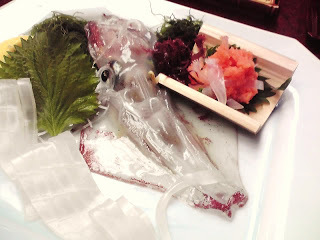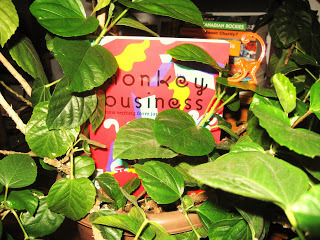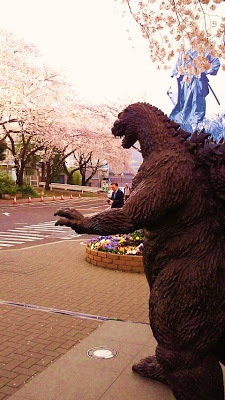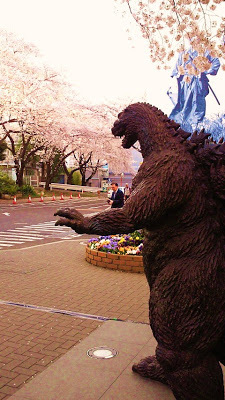Roland Kelts's Blog, page 58
May 5, 2012
Monkey Business launches tomorrow @ NYC
Monkey Launch Part I, May 6 @ 2 p.m.,
Japan/America: Writers' Dialogue
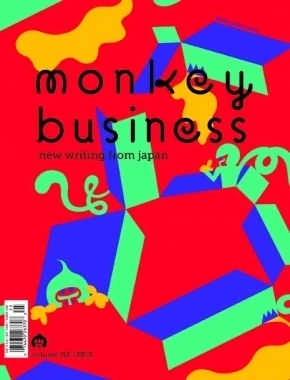
Cover of the literary journal "Monkey Business." (Courtesy Motoyuki Shibata)
Continuing its highly successful 2011 partnership with The Japan Foundation, Asia Society will once again join with Monkey Business, the acclaimed English-language anthology of newly translated Japanese writing, to present an American-Japanese literary dialogue in conjunction with the PEN World Voices International Festival.
Japanese writers Masatsugu Ono and Tomoka Shibasaki will be joined by American poetStuart Dybek and writer Kelly Link for an intriguing and original cross-cultural encounter facilitated by eminent translators Ted Goossen and Motoyuki Shibata.
Followed by a book sale and signing.
Shop AsiaStore for related books
Co-presented by Asia Society and the Japan Foundation.
In association with PEN World Voices 2012, April 30 to May 6. For details, click here.
Click on the following writers' names, below, to read excerpts of their work.
Stuart Dybek
Kelly Link
Masatsugu Ono
Tomoka Shibasaki
Speakers:
Stuart Dybek is a masterful short story writer as well as poet. The qualities that distinguish his fiction — a strong connection to place, particularly his native Chicago, childhood nostalgia tinged with irony, a meandering narrative pace, and an ability to find beauty amid urban blight — also characterize much of his poetry. Few writers have captured street life as movingly as Dybek. The son of a Polish immigrant, he has published two critically acclaimed books of short stories, The Coast of Chicago and Childhood and Other Neighborhoods, as well as a collection of linked stories, I Sailed with Magellan. His most recent book of poems is Streets in Their Own Ink.
Ted Goossen specializes in modern and contemporary Japanese literature, and has translated a number of Japanese writers, including Shiga Naoya, Ibuse Masuji and Haruki Murakami. He is also involved on a regular basis with the Department of Contemporary studies at the University of Tokyo, where he has taught courses in Canadian and Japanese literature and literary translation. He is the editor of The Oxford Book of Japanese Short Stories (Oxford University Press, 1997).
Kelly Link's debut collection, Stranger Things Happen, was a Firecracker nominee, a Village Voice Favorite Book and a Salon Book of the Year — Salon called the collection "...an alchemical mixture of Borges, Raymond Chandler, and Buffy the Vampire Slayer." Stories from the collection have won the Nebula, the James Tiptree Jr., and the World Fantasy Awards. Her second collection, Magic for Beginners, was published in 2005. Link has taught or visited at a number of schools and workshops and she is an editor for the Online Writing Workshop and has been a reader and judge for various literary awards. With Gavin J. Grant and Ellen Datlow she edits The Year's Best Fantasy & Horror (St. Martin's Press). She is also the editor of the anthology Trampoline. Link lives in Northampton, MA. She and her husband, Gavin J. Grant, publish a twice-yearly zine, Lady Churchill's Rosebud Wristlet — as well as books — as Small Beer Press.
Masatsugu Ono is the author of five books of fiction. He received the Asahi New Writers' Award for his first novel Mizu ni Umoreru Haka (Graves Buried in Water) and the Mishima Yukio Prize for his second novel Nigiyaka na Wan ni Seowareta Fune (The Ship Shouldered by the Jolly Bay). He teaches French at Meiji Gakuin University, and has translated Edouard Glissant, V. S. Naipaul and Amitav Ghosh.
Tomoka Shibasaki graduated from Osaka Prefecture University and worked for four years before her debut publication in 2000, the novel Kyō no dekigoto, which was made into a film by Isao Yukisada in 2003 (English title: A Day on the Planet). She wrote Sono Machi No Ima Wa (Today, in that City), which first appeared in Shincho in 2006. It was nominated in 2007 for the Akutagawa Prize.
Motoyuki Shibata (moderator) teaches American literature and literary translation at the University of Tokyo. He is currently Associate Dean of Graduate School of Humanities and Sociology. He received a Kodansha Essay Prize for Namahanka-na Gakusha (A Half-hearted Scholar), a Suntory Prize for Social Sciences and Humanities for The American Narcissus(2005), and in 2011 he received a Japanese Translation Cultural Award for his translation of Thomas Pynchon’s Mason & Dixon. Among contemporary authors he has translated are Paul Auster, Steven Millhauser, Richard Powers, Stuart Dybek and Steve Erickson. He runs his own literary quarterly, Monkey Business, in which both major Japanese and American authors have appeared, including Auster and Haruki Murakami.
Asia Blog interview with Motoyuki Shibata
Can't make it to this program? Tune into AsiaSociety.org/Live at 2:00 pm ET for a free live video webcast. Viewers are encouraged to submit questions to moderator@asiasociety.org
Japan/America: Writers' Dialogue

Cover of the literary journal "Monkey Business." (Courtesy Motoyuki Shibata)
Continuing its highly successful 2011 partnership with The Japan Foundation, Asia Society will once again join with Monkey Business, the acclaimed English-language anthology of newly translated Japanese writing, to present an American-Japanese literary dialogue in conjunction with the PEN World Voices International Festival.
Japanese writers Masatsugu Ono and Tomoka Shibasaki will be joined by American poetStuart Dybek and writer Kelly Link for an intriguing and original cross-cultural encounter facilitated by eminent translators Ted Goossen and Motoyuki Shibata.
Followed by a book sale and signing.
Shop AsiaStore for related books
Co-presented by Asia Society and the Japan Foundation.
In association with PEN World Voices 2012, April 30 to May 6. For details, click here.
Click on the following writers' names, below, to read excerpts of their work.
Stuart Dybek
Kelly Link
Masatsugu Ono
Tomoka Shibasaki
Speakers:
Stuart Dybek is a masterful short story writer as well as poet. The qualities that distinguish his fiction — a strong connection to place, particularly his native Chicago, childhood nostalgia tinged with irony, a meandering narrative pace, and an ability to find beauty amid urban blight — also characterize much of his poetry. Few writers have captured street life as movingly as Dybek. The son of a Polish immigrant, he has published two critically acclaimed books of short stories, The Coast of Chicago and Childhood and Other Neighborhoods, as well as a collection of linked stories, I Sailed with Magellan. His most recent book of poems is Streets in Their Own Ink.
Ted Goossen specializes in modern and contemporary Japanese literature, and has translated a number of Japanese writers, including Shiga Naoya, Ibuse Masuji and Haruki Murakami. He is also involved on a regular basis with the Department of Contemporary studies at the University of Tokyo, where he has taught courses in Canadian and Japanese literature and literary translation. He is the editor of The Oxford Book of Japanese Short Stories (Oxford University Press, 1997).
Kelly Link's debut collection, Stranger Things Happen, was a Firecracker nominee, a Village Voice Favorite Book and a Salon Book of the Year — Salon called the collection "...an alchemical mixture of Borges, Raymond Chandler, and Buffy the Vampire Slayer." Stories from the collection have won the Nebula, the James Tiptree Jr., and the World Fantasy Awards. Her second collection, Magic for Beginners, was published in 2005. Link has taught or visited at a number of schools and workshops and she is an editor for the Online Writing Workshop and has been a reader and judge for various literary awards. With Gavin J. Grant and Ellen Datlow she edits The Year's Best Fantasy & Horror (St. Martin's Press). She is also the editor of the anthology Trampoline. Link lives in Northampton, MA. She and her husband, Gavin J. Grant, publish a twice-yearly zine, Lady Churchill's Rosebud Wristlet — as well as books — as Small Beer Press.
Masatsugu Ono is the author of five books of fiction. He received the Asahi New Writers' Award for his first novel Mizu ni Umoreru Haka (Graves Buried in Water) and the Mishima Yukio Prize for his second novel Nigiyaka na Wan ni Seowareta Fune (The Ship Shouldered by the Jolly Bay). He teaches French at Meiji Gakuin University, and has translated Edouard Glissant, V. S. Naipaul and Amitav Ghosh.
Tomoka Shibasaki graduated from Osaka Prefecture University and worked for four years before her debut publication in 2000, the novel Kyō no dekigoto, which was made into a film by Isao Yukisada in 2003 (English title: A Day on the Planet). She wrote Sono Machi No Ima Wa (Today, in that City), which first appeared in Shincho in 2006. It was nominated in 2007 for the Akutagawa Prize.
Motoyuki Shibata (moderator) teaches American literature and literary translation at the University of Tokyo. He is currently Associate Dean of Graduate School of Humanities and Sociology. He received a Kodansha Essay Prize for Namahanka-na Gakusha (A Half-hearted Scholar), a Suntory Prize for Social Sciences and Humanities for The American Narcissus(2005), and in 2011 he received a Japanese Translation Cultural Award for his translation of Thomas Pynchon’s Mason & Dixon. Among contemporary authors he has translated are Paul Auster, Steven Millhauser, Richard Powers, Stuart Dybek and Steve Erickson. He runs his own literary quarterly, Monkey Business, in which both major Japanese and American authors have appeared, including Auster and Haruki Murakami.
Asia Blog interview with Motoyuki Shibata
Can't make it to this program? Tune into AsiaSociety.org/Live at 2:00 pm ET for a free live video webcast. Viewers are encouraged to submit questions to moderator@asiasociety.org
Published on May 05, 2012 10:17
May 2, 2012
Fukuoka breakfast
Published on May 02, 2012 15:00
Air Again--Osaka > Fukuoka
Published on May 02, 2012 05:00
May 1, 2012
Hotel Room Views: Osaka
Published on May 01, 2012 20:10
April 24, 2012
Monkey Blooms
Published on April 24, 2012 09:29
April 18, 2012
The Monkey has landed
Visit the new website & blog here.
Facebook page is here.
Digital editions forthcoming.
Events
MAY 6
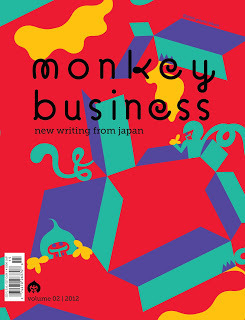
Asia Society will once again join with Monkey Business to present an American-Japanese literary dialogue in conjunction with the PEN World Voices International Festival. Writers Masatsugu Ono and Tomoka Shibasaki—both featured in MBI 2—will be joined by Stuart Dybek and Kelly Link for an intriguing and original cross-cultural encounter facilitated by the eminent translators and co-editors of MBI, Ted Goossen and Motoyuki Shibata.
Followed by a book sale and signing. More information
Posted on March 1, 2012 | |
Events
MAY 6 JAPAN NIGHT AT JOE'S PUB
Live from Tokyo, it's "Japan Night @ Joe's Pub," a unique and very special transcultural evening of readings, music, and live performances in the heart of downtown Manhattan. Revered Japanese writers Masatsugu Ono and Tomoka Shibasaki and award-winning author and translator Motoyuki Shibata arrive from Tokyo to share the stage with American authors Stuart Dybek and Kelly Link and Canadian translator, scholar, and editor Ted Goossen to launch the second issue of MBI. The evening will be hosted by Japanamerica author and Monkey Business contributing editor Roland Kelts, and a short list of special guest musicians and performers will be announced soon. Japanese-themed food and drink will be available; book-signings and a meet and greet session will follow. Brought to you by A Public Space Literary Projects and the Happy Ending Reading Series.
Click here for tickets.
Posted on March 1, 2012 | Comment | Permalink
Events
MAY 7 MONKEY BUSINESS AT COLUMBIA
Following a reading by authors Masatsugu Ono and Tomoka Shibasaki, the writers will be joined by Motoyuki Shibata and Ted Goossen, co-editors of Monkey Business International , to discuss the journal and contextualize their work in the broader literary culture of both Japan and the United States.
May 7, 6:00pm
Room 403, Kent Hall
Columbia University
Posted on March 1, 2012 | Comment | Permalink
Events
MAY 9 MONKEY BUSINESS LAUNCH PARTY
In celebration of the release of MBI 2, which once again brings the best of contemporary Japanese literature to English readers, co-editors Motoyuki Shibata and Ted Goossen will lead a reading and discussion that will feature Masatsugu Ono, Tomoka Shibasaki, Roland Kelts, Kelly Link, and Barry Yourgrau, who are all included in the new issue. The issue will be on sale at the reading, along with complimentary wine and beer. Don’t miss it!
Facebook page is here.
Digital editions forthcoming.
Events
MAY 6

Asia Society will once again join with Monkey Business to present an American-Japanese literary dialogue in conjunction with the PEN World Voices International Festival. Writers Masatsugu Ono and Tomoka Shibasaki—both featured in MBI 2—will be joined by Stuart Dybek and Kelly Link for an intriguing and original cross-cultural encounter facilitated by the eminent translators and co-editors of MBI, Ted Goossen and Motoyuki Shibata.
Followed by a book sale and signing. More information
Posted on March 1, 2012 | |
Events
MAY 6 JAPAN NIGHT AT JOE'S PUB
Live from Tokyo, it's "Japan Night @ Joe's Pub," a unique and very special transcultural evening of readings, music, and live performances in the heart of downtown Manhattan. Revered Japanese writers Masatsugu Ono and Tomoka Shibasaki and award-winning author and translator Motoyuki Shibata arrive from Tokyo to share the stage with American authors Stuart Dybek and Kelly Link and Canadian translator, scholar, and editor Ted Goossen to launch the second issue of MBI. The evening will be hosted by Japanamerica author and Monkey Business contributing editor Roland Kelts, and a short list of special guest musicians and performers will be announced soon. Japanese-themed food and drink will be available; book-signings and a meet and greet session will follow. Brought to you by A Public Space Literary Projects and the Happy Ending Reading Series.
Click here for tickets.
Posted on March 1, 2012 | Comment | Permalink
Events
MAY 7 MONKEY BUSINESS AT COLUMBIA
Following a reading by authors Masatsugu Ono and Tomoka Shibasaki, the writers will be joined by Motoyuki Shibata and Ted Goossen, co-editors of Monkey Business International , to discuss the journal and contextualize their work in the broader literary culture of both Japan and the United States.
May 7, 6:00pm
Room 403, Kent Hall
Columbia University
Posted on March 1, 2012 | Comment | Permalink
Events
MAY 9 MONKEY BUSINESS LAUNCH PARTY
In celebration of the release of MBI 2, which once again brings the best of contemporary Japanese literature to English readers, co-editors Motoyuki Shibata and Ted Goossen will lead a reading and discussion that will feature Masatsugu Ono, Tomoka Shibasaki, Roland Kelts, Kelly Link, and Barry Yourgrau, who are all included in the new issue. The issue will be on sale at the reading, along with complimentary wine and beer. Don’t miss it!
Published on April 18, 2012 08:37
April 17, 2012
Japanamerica on the BBC
Published on April 17, 2012 08:46
April 12, 2012
Pokemon turns 15
My comments to author and critic Charles Solomon on Pokemon's 15th birthday and the series' critical role in the spread of anime and Japanese pop culture in the West--in the
Los Angeles Times
:
'Pokémon' at 15: Success is still in the cards, films and TV shows
After 15 years, 700 TV episodes and 14 feature films, Ash Ketchum and millions of kids are still trying to catch 'em all.
In April 1997, the animated version of "Pokémon" premiered on Japanese television. Based on the hit Nintendo Game Boy title introduced two years earlier, the series follows the travels and travails of Ketchum (Satoshi in the original) as he tries to become a Pokémon Master by building a team that can beat other trainers in stylized battles. Traveling with Ash are perennially love-sick Brock, feisty Misty and Pikachu, the "electric mouse" Pokémon.
The series scored a huge hit in Japan, and by 1999 the game and show had conquered America. Pokémon paraphernalia were everywhere. The original motto, "Pokémon Getto Daze!" (Let's Get Pokémon!) became "Gotta Catch 'em All!" The first "Pokémon" feature film grossed more than $85 million, and horror stories appeared on the news about kids stealing one another's "Pokémon" trading cards.
Once the craze peaked, the mainstream media and a large portion of the population assumed that "Pokémon" faded away. But gamers, anime fans and parents of elementary school boys know it's still very present — as its staggering sales attest.

Pokémon Black Version/White Version video game. (The Pokémon Company International)
"People remember the late '90s/early 2000s 'Pokémon' because it was so big," says J.C. Smith, marketing director for the Pokémon Co. International. "Many people believe 'Pokémon' went somewhere after that, when it's been steady for 15 years. Over that time, 230 million 'Pokémon' video games have been sold worldwide: The franchise is second only to 'Mario,' which began 10 years earlier. The most recent game, Pokémon Black Version/White Version, has almost sold 14 million units so far. Over the years, we've also sold 19 billion Pokémon cards."
That's more than two cards for every person on the planet.
The animated series is licensed in 160 countries in 30 languages. More than 700 episodes have been broadcast over the last 15 years — by comparison, in February, "The Simpsons" hit its 500th episode over 23 seasons.

The characters of the "Pokémon: BW Rival Destinies" TV series. (The Pokémon Company International)
Although "Pokémon" has been accused of fostering gambling, un-Islamic conduct and Darwinism, the series and games stress friendship and good sportsmanship. When a player wins, it's not a glorious victory but a testament to his exceptional bond with his Pokémon. In the series, Ash never allows anyone to mistreat a Pokémon, and he learns self-sacrifice when he permits his Butterfree to find a mate and depart for their nesting grounds.
"Pokémon" also awakened a generation of American children to the wonders of Japanese animation. Roland Kelts, the author of "Japanamerica: How Japanese Pop Culture Has Invaded the U.S.," comments, " 'Pokémon' was a breakthrough series for anime and remains one of its touchstones. It also introduced audiences, usually kids, to what I call anime style: the line-based, edgy-looking, two-dimensional visuals, and a golden triangle of merchandising strategies comprising games, collectibles and the stories themselves. Shows like 'Pokémon' and 'Dragon Ball Z' serve as gateway drugs to anime, manga and sometimes Japanese culture itself. They're often the childhood catalysts for college students who study Japanese in the U.S., or sign up for short-term home-stays or English-teaching gigs."

Pokémon game cards. (The Pokémon Company International)
In August, players from 25 countries will compete in the Pokémon championships in Kona, Hawaii. The 14th "Pokémon" feature recently aired on Cartoon Network and will appear on DVD this month. This fall, Pokémon Black and White Version 2 games will debut—the first sequels in the history of the franchise. The online Pokémon Trading Card Game — for people who want to learn and play whenever they have free time — is in open beta at www.pokemontcg.com.
When asked about the enduring appeal of "Pokémon," Smith replies, "One of the reasons is the richness of its world. There are more than 640 Pokémon now, so everyone has a favorite or a team of favorites. The principle tenet of 'Pokémon' is collect, trade and battle: Now you have 640 options. You can collect them, trade them with your friends, or train them for battle in the trading card or video games. People want to complete their collections or find that one new Pokémon that helps their battle strategy."
– Charles Solomon
'Pokémon' at 15: Success is still in the cards, films and TV shows
After 15 years, 700 TV episodes and 14 feature films, Ash Ketchum and millions of kids are still trying to catch 'em all.
In April 1997, the animated version of "Pokémon" premiered on Japanese television. Based on the hit Nintendo Game Boy title introduced two years earlier, the series follows the travels and travails of Ketchum (Satoshi in the original) as he tries to become a Pokémon Master by building a team that can beat other trainers in stylized battles. Traveling with Ash are perennially love-sick Brock, feisty Misty and Pikachu, the "electric mouse" Pokémon.
The series scored a huge hit in Japan, and by 1999 the game and show had conquered America. Pokémon paraphernalia were everywhere. The original motto, "Pokémon Getto Daze!" (Let's Get Pokémon!) became "Gotta Catch 'em All!" The first "Pokémon" feature film grossed more than $85 million, and horror stories appeared on the news about kids stealing one another's "Pokémon" trading cards.
Once the craze peaked, the mainstream media and a large portion of the population assumed that "Pokémon" faded away. But gamers, anime fans and parents of elementary school boys know it's still very present — as its staggering sales attest.

Pokémon Black Version/White Version video game. (The Pokémon Company International)
"People remember the late '90s/early 2000s 'Pokémon' because it was so big," says J.C. Smith, marketing director for the Pokémon Co. International. "Many people believe 'Pokémon' went somewhere after that, when it's been steady for 15 years. Over that time, 230 million 'Pokémon' video games have been sold worldwide: The franchise is second only to 'Mario,' which began 10 years earlier. The most recent game, Pokémon Black Version/White Version, has almost sold 14 million units so far. Over the years, we've also sold 19 billion Pokémon cards."
That's more than two cards for every person on the planet.
The animated series is licensed in 160 countries in 30 languages. More than 700 episodes have been broadcast over the last 15 years — by comparison, in February, "The Simpsons" hit its 500th episode over 23 seasons.

The characters of the "Pokémon: BW Rival Destinies" TV series. (The Pokémon Company International)
Although "Pokémon" has been accused of fostering gambling, un-Islamic conduct and Darwinism, the series and games stress friendship and good sportsmanship. When a player wins, it's not a glorious victory but a testament to his exceptional bond with his Pokémon. In the series, Ash never allows anyone to mistreat a Pokémon, and he learns self-sacrifice when he permits his Butterfree to find a mate and depart for their nesting grounds.
"Pokémon" also awakened a generation of American children to the wonders of Japanese animation. Roland Kelts, the author of "Japanamerica: How Japanese Pop Culture Has Invaded the U.S.," comments, " 'Pokémon' was a breakthrough series for anime and remains one of its touchstones. It also introduced audiences, usually kids, to what I call anime style: the line-based, edgy-looking, two-dimensional visuals, and a golden triangle of merchandising strategies comprising games, collectibles and the stories themselves. Shows like 'Pokémon' and 'Dragon Ball Z' serve as gateway drugs to anime, manga and sometimes Japanese culture itself. They're often the childhood catalysts for college students who study Japanese in the U.S., or sign up for short-term home-stays or English-teaching gigs."

Pokémon game cards. (The Pokémon Company International)
In August, players from 25 countries will compete in the Pokémon championships in Kona, Hawaii. The 14th "Pokémon" feature recently aired on Cartoon Network and will appear on DVD this month. This fall, Pokémon Black and White Version 2 games will debut—the first sequels in the history of the franchise. The online Pokémon Trading Card Game — for people who want to learn and play whenever they have free time — is in open beta at www.pokemontcg.com.
When asked about the enduring appeal of "Pokémon," Smith replies, "One of the reasons is the richness of its world. There are more than 640 Pokémon now, so everyone has a favorite or a team of favorites. The principle tenet of 'Pokémon' is collect, trade and battle: Now you have 640 options. You can collect them, trade them with your friends, or train them for battle in the trading card or video games. People want to complete their collections or find that one new Pokémon that helps their battle strategy."
– Charles Solomon
Published on April 12, 2012 06:00
April 11, 2012
Godzilla Ohanami, w/sakura in Seijo
Published on April 11, 2012 06:19
Godzilla Hanami, w/sakura in Seijo
Published on April 11, 2012 06:19

